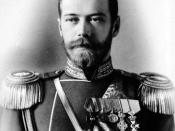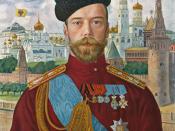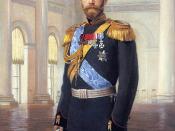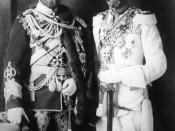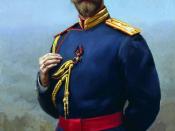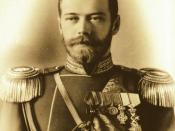Tsar Nicholas II"The Emperor Nicholas II is one of the most pathetic figures in history. He loved his country. He had its welfare and greatness at heart. Yet it was he who was to precipitate the catastrophe, which has brought it to utter ruin and miseryâ¦Nicholas had not inherited his father's commanding personality nor the strong character and prompt decision which are so essential to an autocratic ruler." (Bucklow & Russell, 1976, p. 108)Tsar Nicholas II came into reign in 1894 when his father Alexander III unexpectedly died at the age of 49. From a political and social standpoint, at the age of 26, Nicholas II was unprepared for leadership and he lacked the qualities and skills to fulfill an autocratic position of power (as suggested in the quote above). Nicholas II was responsible for the modernization of Russia, the discontent within the populace, war, and a range of protests; most of which he was not even capable of administering.
He was extremely ignorant and extended what influence he had to secluding his royal family from the world. Nicholas II cannot be held entirely responsible for the deterioration of Russia as there were a number of factors which lead to its revolution such as industrialism, revolutionary parties, peasantry and failed reforms. Ultimately, the Tsar was unable to maintain the autocracy of Russia at the pace of the global socio-economic change.
Nicholas II was initially reluctant to take on the role of Tsar, but wanted to continue the tradition of autocratic rule and believed it was God's wish for him to do so; he was an extremely religious man as well as his family. His acute nepotism resulted in the selection of ministers who told him what he wanted to hear rather than the advice that would help Russia. When he was appointed Tsar, the thing he focussed on directly was the development of the military; this was necessary owing to the defeat in the Crimean War. As a result of the modernization of the army, political rejuvenation was necessary, of which Nicholas II was opposed to. He lacked the capability to balance out the things he needed to take care of, and rather, flung himself into expanding the military in order for him to be glorified. He was the type of man who was easily influenced as long as he was in power. His wife, Alexander, is a great example of this as she encouraged him to front with the military and insisted that she would take care of political matters at home, which she hugely underestimated.
Even from the beginning, the reign had complications. There was encouraged industrial growth which resulted in a 55 percent rise in the population. The peasants comprised approximately 82 percent of the population and were a discontent crowd difficult to control. By the year 1900, most, if not all of the growing divisions of Russia's population were disaffected. Nicholas II had begun receiving strong advice to enhance the government system but he refused this, preferring to follow his father and continue the repression. There was a general strike of approximately 13,000 who protested; many strikes followed. The secret police were trying to sway this discontent by the use of violence which was 'the only way', as suggested by Leo Tolstoy in a letter to Nicholas: "secret police continuously growing in numbersâ¦prisons and penal colonies are over-crowdedâ¦persecutions have never been so frequent and so cruel as they are today, and they still grow more frequent and more cruelâ¦that is why it is impossible to maintain this form of government except by violence." (Hite, 1989, pp. 33-34) War broke out with Japan in February 1904, accentuating how weak the military of Russia really was. The Baltic Fleet was deployed to reinforce Manchuria, but by the time the fleet made it to the Pacific, the war was over and Russia's Pacific coastal forces crumbled. This was the first ever defeat of a European country to an Asian nation, and as a result, there was an increase in the populations scream for reform.
Modernisation was a colossal fixation in Russia during Nicholas's reign and arose as a result of Nicholas II's ambition to advance the army. The modernisation of the army meant that the economy in turn had to be modernised; the only thing Nicholas wouldn't address was the modernisation of the political system. This was a consequential mistake as revolution ensued regardless, just in a more persistent means. The economic change encouraged political contemplation, which created the demand for political change. The economic change hit the peasants hard as there were famines- this resulted in a population explosion. Peasants became angry, wanted their land repayments to end and they also wanted reform. Industrialisation was rapid in the time of this modernisation. The conditions for the army were hard as the government focused on the completion of the developments for army use.
The war in Japan intensified the discontent amongst all classes; there were strikes and protests all over Russia and even the peasants became involved as they were more aware and intellectual. Many incidents occurred in 1905 which marked the beginning of the revolution. All members of society wanted something changedâ¦the middle-class wanted a constitution, revolutionaries wanted revolution and national minorities wanted independence. These three groups all saw the regime as weak and unwarranted. On 22nd January, 1905, 'Bloody Sunday' enforced the national cry for reform. The march of 150,000 led by Father George Gapon protested for: "a guarantee of liberties, for example, freedom of speech; measures to alleviate poverty, including the introduction of an income tax; better working conditions, such as an eight-hour day" (Dennett, Dixon, 2000, p.34). Because Tsar wasn't at the Winter Palace during the event of the march, the secret police and regular troops panicked and shot people down; the official death toll was 92. This tragic misinterpretation by the officers spread all over Russia and caused huge problems for Nicholas II. Strikes and protests continued at a worse level and in May, the first soviet group formed; mutiny broke out by June and by October the series of events reached a climax. There was a general strike and functioning stopped with "transport, communications, factories, shops, schools, universities and government offices." (Anderson, Low, Keese, 2004, p.50). Nicholas hadn't handled the situation well and is responsible for this chaos. On October 17th, the Tsar signed the Manifesto on advice by Witte; Nicholas was against it but he felt that there was no other way.
Political developments in the form of Dumas were marked from 1906. The first was in April and lasted just three months; it requested further power and the cancellation of peasant land repayments. The Tsar saw this as preposterous and it was soon dissolved. The second duma consisted of an abundance of anti-government people. Stolypin proposed agrarian reforms which were also dissolved in June. The third duma was long lasting going from 1907-1912. During this time, reforms were made, and it was very productive; Stoylpin's land reforms passed, along with national insurance for workers and schools for the poor. The forth duma (1912-1914) continued reform in schools but due to government criticism, it was dissolved. The Duma assemblies were a positive contribution to the progress of Russia. If the Tsar wasn't as stubborn and ignorant or defensive on criticism to the autocratic system of government, Russia could have excelled along with the other European countries. Although there were limitations in the amount of power with the Duma's, it did make reform which was good as it rectified a lot of issues.
World War One had a huge impact on Russia and contributed exceedingly to the collapse and destruction of Tsarism. The war was hastily entered by Tsar Nicholas II and it put a huge strain on the military, but more so the economy. Russia went into the war incredibly unprepared, due to Sukhomlinov's misjudgement of the requirements. They had inadequate supplies, extreme economic problems and the peasants had shortages of food and other necessities due to the army's claim to the food. Grain production fell by 20 percent by 1916 along with exports falling by 86.7 percent. Russia fell short of money and had to borrow from allies, resulting in inflation. All the transport systems broke down and food was unable to be transported to the cities. In the first year of the war, almost 4 million soldiers were killed, mainly due to their insufficient training and supplies. Millions in the rural areas were also killed, meaning less farming. With what seemed to be collateral damage, people started to strike and protest more than ever. The Tsar may have expected the war to be short but his miscalculations drove the revolution.
Following WW1 the Tsar had a lot more opposition; this wasn't just from revolutionary groups, but also from the people. The events and crisis of WW1 clearly showed everyone the incompetence and the diffidence that the Tsar had. Due to their antagonism towards the Tsar and their desperation for a revolution, the revolutionary groups persisted and took more action. There were three main revolutionary groups: the Social Revolutionaries, Marxists (Mensheviks, Bolsheviks) and Liberals (Octobrists, Kadets). Each group had slightly different aims and methods though they all wanted the same thing- an improved political system without Tsar. This new extreme opposition to Nicholas II produced far more riots, hostility and turmoil.
When the Tsar was staying at the military headquarters he left the Tsarina in charge of the government received the news through her letters. Tsarina was a bad influence on Nicholas and was the main reason for many of his bad decisions, but Rasputin had an influence on Tsarina- which also caused bad government decisions on her behalf. She learned of disturbances in Petrograd by slaves and entourage, and so she informed Tsar right away. When Nicholas received this letter he ordered general Khalbalov to restore order. Khalbalov was unable to do this as everything was uncontrollable and out of hand. On 27th February Kerensky, who was a significant part of the SR, wrote to Nicholas and demanded that he abdicated and gave up his role as Tsar. Rodzyanko, who opposed the Tsar post-war as well, strongly suggested that Tsar step down due to the gradual destruction of Russia of which he wasn't addressing. In response to Rodzyanko's words the Tsar said, "Again that fat-bellied Rodzyanko has written me a lot of nonsense, which I won't even bother to answer" (Cape, 1996, p.339). This response indicates to us how Nicholas would not even consider any advice to save 'his' Russia. Nicholas decided to come home on 28th January in hope that he could fix everything. His royal train was halted and Stavka strongly advised him to abdicate. After hesitation the Tsar abdicated. His brother refused the thrown. This ended the 300 year Romanov Dynasty.
The personality and character of Nicholas II was a huge part of the collapse of the Russian monarchy. The Tsar was extremely stubborn and indecisive, more often then not refusing to even listen to advice which may even benefit him and Russia. WW1 accelerated the revolution; there was a lot more opposition and demand. The Dumas initiated reform which helped, but the Tsar disliked not having complete power. If he allowed the Dumas to continue, and reform was had gradually, he would have been able to remain Tsar. Another alternative was to change the political system to a democratic one, allowing him to still have control- he was just too close-minded for this. There were smaller factors which contributed to the collapse, but Nicholas II and his poor decisions were the most significant.
Anderson, M. Low, A.Keese,I. 2008. Retrospective. Jacaranda. Milton.
Bucklow, M & Russell, G. 1976. Russia: Why Revolution? Longman Australia. Hong Kong.
Darby, G. 1998. The Russian Revolution. Longman Singapore Publisher Pte Ltd. Singapore.
Darlington, R. Greer, V. McCallum, A. Lumsdaine, J. McAlister, Y. 2002. Turning Points: Modern History Depth Studies. Heinemann. MelbourneDennett, B. Dixon, S. 2000. Key Features of Modern History. Oxford University Press. Melbourne.
Hite, J. 1989. Tsarist Russia 1801-1917. Causeway Press. Ormskirk.
Lynch, M. 1992. Reaction and Revolutions: Russia 1881-1924. Hodder & Stoughton. London.
Lynch, M. 2005. Reaction and Revolution: Russia 1894-1924 (3rd edition) Hodder Education. London.
Westwood, J.N. 1981. The Short Oxford History Of The Modern World- Endurance And Endeavour-Russian History 1812-1980. 2nd Edition. Oxford University Press. New York.
